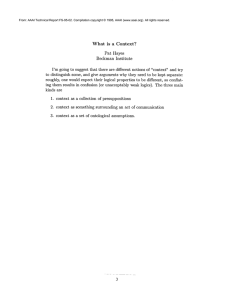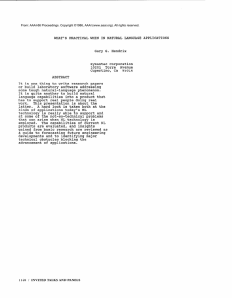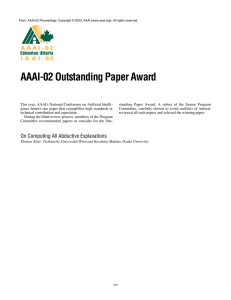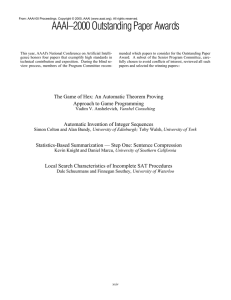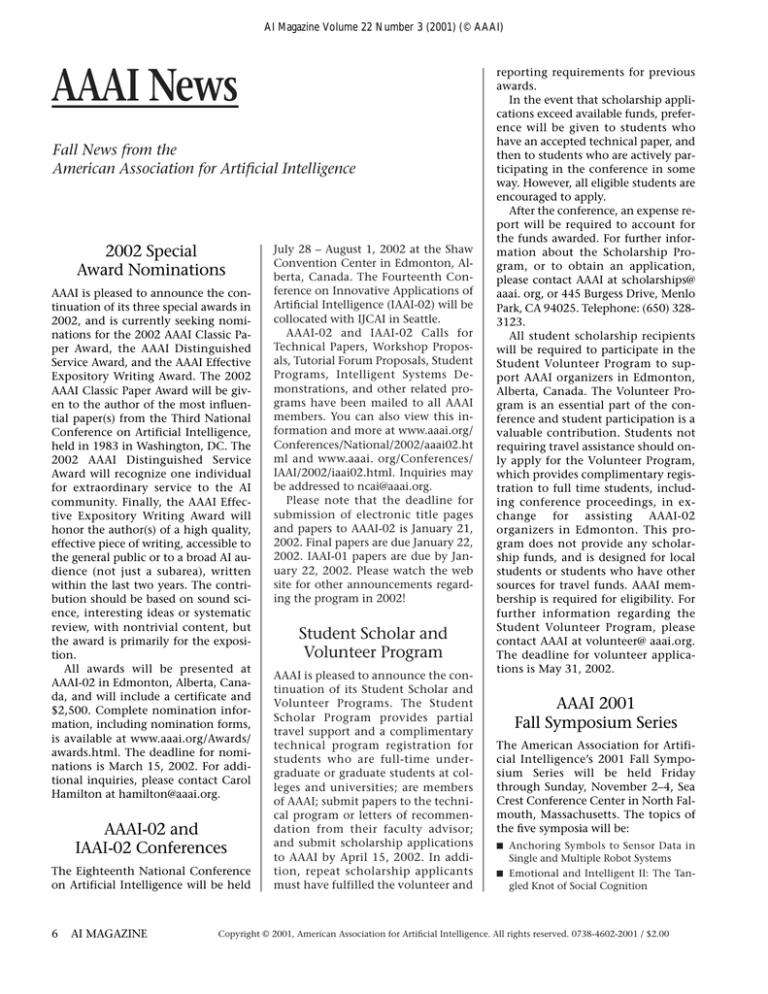
AI Magazine Volume 22 Number 3 (2001) (© AAAI)
AAAI News
Fall News from the
American Association for Artificial Intelligence
2002 Special
Award Nominations
AAAI is pleased to announce the continuation of its three special awards in
2002, and is currently seeking nominations for the 2002 AAAI Classic Paper Award, the AAAI Distinguished
Service Award, and the AAAI Effective
Expository Writing Award. The 2002
AAAI Classic Paper Award will be given to the author of the most influential paper(s) from the Third National
Conference on Artificial Intelligence,
held in 1983 in Washington, DC. The
2002 AAAI Distinguished Service
Award will recognize one individual
for extraordinary service to the AI
community. Finally, the AAAI Effective Expository Writing Award will
honor the author(s) of a high quality,
effective piece of writing, accessible to
the general public or to a broad AI audience (not just a subarea), written
within the last two years. The contribution should be based on sound science, interesting ideas or systematic
review, with nontrivial content, but
the award is primarily for the exposition.
All awards will be presented at
AAAI-02 in Edmonton, Alberta, Canada, and will include a certificate and
$2,500. Complete nomination information, including nomination forms,
is available at www.aaai.org/Awards/
awards.html. The deadline for nominations is March 15, 2002. For additional inquiries, please contact Carol
Hamilton at hamilton@aaai.org.
AAAI-02 and
IAAI-02 Conferences
The Eighteenth National Conference
on Artificial Intelligence will be held
6
AI MAGAZINE
July 28 – August 1, 2002 at the Shaw
Convention Center in Edmonton, Alberta, Canada. The Fourteenth Conference on Innovative Applications of
Artificial Intelligence (IAAI-02) will be
collocated with IJCAI in Seattle.
AAAI-02 and IAAI-02 Calls for
Technical Papers, Workshop Proposals, Tutorial Forum Proposals, Student
Programs, Intelligent Systems Demonstrations, and other related programs have been mailed to all AAAI
members. You can also view this information and more at www.aaai.org/
Conferences/National/2002/aaai02.ht
ml and www.aaai. org/Conferences/
IAAI/2002/iaai02.html. Inquiries may
be addressed to ncai@aaai.org.
Please note that the deadline for
submission of electronic title pages
and papers to AAAI-02 is January 21,
2002. Final papers are due January 22,
2002. IAAI-01 papers are due by January 22, 2002. Please watch the web
site for other announcements regarding the program in 2002!
Student Scholar and
Volunteer Program
AAAI is pleased to announce the continuation of its Student Scholar and
Volunteer Programs. The Student
Scholar Program provides partial
travel support and a complimentary
technical program registration for
students who are full-time undergraduate or graduate students at colleges and universities; are members
of AAAI; submit papers to the technical program or letters of recommendation from their faculty advisor;
and submit scholarship applications
to AAAI by April 15, 2002. In addition, repeat scholarship applicants
must have fulfilled the volunteer and
reporting requirements for previous
awards.
In the event that scholarship applications exceed available funds, preference will be given to students who
have an accepted technical paper, and
then to students who are actively participating in the conference in some
way. However, all eligible students are
encouraged to apply.
After the conference, an expense report will be required to account for
the funds awarded. For further information about the Scholarship Program, or to obtain an application,
please contact AAAI at scholarships@
aaai. org, or 445 Burgess Drive, Menlo
Park, CA 94025. Telephone: (650) 3283123.
All student scholarship recipients
will be required to participate in the
Student Volunteer Program to support AAAI organizers in Edmonton,
Alberta, Canada. The Volunteer Program is an essential part of the conference and student participation is a
valuable contribution. Students not
requiring travel assistance should only apply for the Volunteer Program,
which provides complimentary registration to full time students, including conference proceedings, in exchange for assisting AAAI-02
organizers in Edmonton. This program does not provide any scholarship funds, and is designed for local
students or students who have other
sources for travel funds. AAAI membership is required for eligibility. For
further information regarding the
Student Volunteer Program, please
contact AAAI at volunteer@ aaai.org.
The deadline for volunteer applications is May 31, 2002.
AAAI 2001
Fall Symposium Series
The American Association for Artificial Intelligence’s 2001 Fall Symposium Series will be held Friday
through Sunday, November 2–4, Sea
Crest Conference Center in North Falmouth, Massachusetts. The topics of
the five symposia will be:
■ Anchoring Symbols to Sensor Data in
Single and Multiple Robot Systems
■ Emotional and Intelligent II: The Tan-
gled Knot of Social Cognition
Copyright © 2001, American Association for Artificial Intelligence. All rights reserved. 0738-4602-2001 / $2.00
AAAI News
■ Intent Inference for Collaborative Tasks
■ Negotiation Methods for Autonomous
Cooperative Systems
■ Using Uncertainty within Computation
A general plenary session, in which
the highlights of each symposium will
be presented, will be held on Saturday,
November 3, and an informal reception will be held on Friday, November
2. Symposia will be limited to between
forty and sixty participants. Each participant will be expected to attend a
single symposium. In addition to invited participants, a limited number of
other interested parties will be allowed
to register in each symposium on a
first-come, first-served basis. Working
notes will be prepared and distributed
to participants in each symposium,
but will not otherwise be available unless published as an AAAI Technical
Report or edited collection.
The final deadline for registration
is September 21, 2001. For registration information, please contact
AAAI at fss@aaai..org or visit AAAI’s
web site at www.aaai.org/Symposia/
Fall/fall-symposia.html. A hotel room
block has been reserved at the Sea
Crest Resort. The cut-off date for
reservations is October 1, 2001. Please
call 1-800-225-3110 or 1-508-5407602 for further information.
AAAI INTEL ISEF
Special Awards
Now in its third year, the AAAI Special Awards program at the annual Intel International Science & Engineering Fair (ISEF) consists of up to 15
awards to recognize outstanding
achievement in the area of intelligent
computation and robotics. The
awards are intended for the best exhibits in the area of computer science
with an artificial intelligence component. Finalists in other areas with significant computer science components are also eligible. The student
authors of each award-winning project share $1,000 and each student receives a certificate and other momentos. The winners and their schools
also receive a complimentary oneyear membership in the AAAI, including a subscription to AI Magazine.
The 2001 winners are as follows:
Congratulations to the 2001 AAAI Fellows!
Each year a small number of fellows are recognized for their unusual distinction in the profession and for their sustained contributions to the field
for a decade or more. An official dinner and ceremony will be held in their
honor at IJCAI-01 in Seattle, Washington.
Edmund H. Durfee, University of Michigan
For significant contributions to the field of multiagent systems, distributed computing and real-time intelligent control.
David Heckerman, Microsoft Research
For significant contributions to reasoning and learning under uncertainty.
Peter Norvig, Google, Inc.
For significant contributions to educational materials, natural language processing techniques, web-based technology, and research management and leadership.
Reid G. Smith, Schlumberger Limited
For significant contributions to the science and practice of
knowledge management, and for his role as principal architect of the widely cited contract net methodology.
Richard S. Sutton, AT&T Research
For significant contributions to many topics in machine
learning, including reinforcement learning, temporal difference techniques, and neural networks.
Michael Wellman, University of Michigan
For significant contributions to decision theory, qualitative
probabilistic and utilitarian reasoning, planning, multiagent
systems, computational economics, electronic commerce,
and editing the Journal of Artificial Intelligence Research.
FALL 2001 7
AAAI News
The AAAI Special Awards Program Winners from the Annual Intel International Science & Engineering Fair (ISEF)
Isomap and Neural Networks:
Comparison of Frameworks for
Dimensionality
Kevin Scott Christopher
Engelwood, CO
Greedy Random: A Novel Algorithm
for Vehicle Routing Optimization
Dominik Rabiej
Mattawan, MI
Comparison and Analysis of Pathfinding Algorithms
Scott Bender
Columbia, SC
Compression-based Author Recognition Algorithms
Rishi Mukhopadhyay
Bloomfield Hills, MI
i-Com: An Intelligent Image Processing System
Yeong-jun Park
Busan, South Korea
Comparison of Learning Algorithms
for Autonomous Robots
Felix Schmaeschke
Leipzig, Germany
Artificial Neural Networks as Applied
to an Intelligent Alarm System
8
AI MAGAZINE
Bernard Willers and Josef Vrba
Republic of South Africa
Can an Unbeatable AI be Created for
Connect Four?
Isaac Bowen and Henry Pate
Port Orange, FL
Cost Minimization through Flight
Scheduling
Sarah Oman, Elizabeth Brown, &
Thomas Widland
New Mexico
Autonomous Robot: Modeling the Behavior of a Falling Dog
Elizabeth Wood
Shaker Heights, OH
Rox-544 v.2: Walking Like an Insect
Alexis Lussier Desbiens
Quebec, Canada
Compound Rules in an Iterated Prisoner’s Dilemma
Edward Hinson and Victor Kostyuk
Little Rock, AR
AAAI congratulates all the winners! In
addition, we would like to recognize
the judges, who attended the fair in
San Jose and selected the 12 winning
projects and 17 winning students
from many remarkable and worthy
entries. Many thanks to Reid Simmons
(Chair), Pat Hayes, and Martha Pollack
for their generous donations of time
and energy.
AAAI 2002
Fall Symposium Series
Proposals are being sought for the
2002 Fall Symposium, site and dates to
be announced. The venue is expected
to continue on the east coast. All proposals will be reviewed by the AAAI
Symposium Committee (Chair Dan
Clancy, NASA Ames Research Center;
Cochair TBA; Associate Chair David
Poole, University of British Columbia).
Symposium proposals should be submitted as soon as possible, but no later
than October 15, 2001. Notifications
of acceptance or rejection will be sent
to submitters around October 29,
2001. A Call for Participation will be
issued in December. Please see
www.aaai.org/Symposia/Fall/fall-symposia.html for further information.
AAAI News
Cavelos Tackles Robot Rescue at the IJCAI 2001 Conference.
(AI Magazine will feature full coverage of the IJCAI 2001 robot events in an upcoming issue.
Photo courtesy Mark Micire, University of South Florida, Tampa.
AAAI Executive Council
Nominations
should they be elected. The deadline
for nominations is November 1, 2001.
Every year four new councilors are
elected to serve three-year terms on
the AAAI Executive Council. The
Nominating Committee encourages
all regular members in good standing
to place an individual’s name before
them for consideration. The Nominating Committee, in turn, will nominate eight candidates for councilor in
the spring. In addition to members’
recommendations, the committee will
actively recruit individuals in order to
provide a balanced slate of candidates.
AAAI members will vote in the late
spring of 2002.
To submit a candidate’s names for
consideration, please send the individual’s name, address, phone number,
and email address to:
Carol Hamilton,
Executive Director, AAAI
445 Burgess Drive
Menlo Park, CA 94025
fax: 650-321-4457
e-mail:hamilton@aaai.org.
Nominators should contact candidates prior to submitting their names
to verify that they are willing to serve,
AAAI 2002
Spring Symposium Series
Call for Participation
The American Association for Artificial
Intelligence presents the 2002 Spring
Symposium Series, to be held Monday
through Wednesday, March 25-27,
2002, at Stanford University. The topics of the nine symposia will be:
■ Acquiring (and Using) Linguistic (and
World) Knowledge for Information Access
■ Artificial Intelligence and Interactive En-
tertainment
■ Collaborative Learning Agents
■ Information Refinement and Revision
for Decision Making: Modeling for Diagnostics, Prognostics, and Prediction
■ Intelligent Distributed and Embedded
Systems
■ Logic-Based Program Synthesis: State of
the Art and Future Trends
■ Mining Answers from Texts and Knowl-
edge Bases
■ Safe Learning Agents
■ Sketch Understanding
Symposia will be limited to between
forty and sixty participants. Each participant will be expected to attend a
single symposium. Working notes will
be prepared and distributed to participants in each symposium. A general
plenary session, in which the highlights of each symposium will be presented, will be held on Tuesday, March
26, and an informal reception will be
held on Monday, March 25. In addition to invited participants, a limited
number of other interested parties will
be able to register in each symposium
on a first-come, first-served basis. Registration information will be available
by December 15, 2001. Please contact
AAAI at sss@aaai.org or visit our web
site at www.aaai.org/Symposia/Spring/
spring-symposia.html.
Submission Information
Submissions for the symposia are due
on October 5, 2001. Notification of acceptance will be given by November 9,
2001. Material to be included in the
working notes of the symposium must
be received by January 21, 2002. The
complete Call for Participation is
available at www.aaai.org/Symposia/
Spring/2002/sss-02.html.
FALL 2001 9
AAAI News
Independent
Auditor’s Report
The Board of Directors
American Association for Artificial
Intelligence
Menlo Park, California
I have audited the statement of financial position of American Association
for Artificial Intelligence as of December 31, 2000 and the related statements of activities, changes in net assets and cash flows for the year then
ended. These financial statements are
the responsibility of the Association’s
management. My responsibility is to
express an opinion on these financial
statements based on the audits.
I conducted the audits in accordance with generally accepted auditing standards. Those standards require
that I plan and perform the audit to
obtain reasonable assurance about
whether the financial statements are
free of material misstatement. An audit includes examining, on a test basis,
evidence supporting the amounts and
disclosures in the financial statements.
An audit also includes assessing the accounting principles used and significant estimates made by management,
as well as evaluating the overall financial statement presentation. I believe
that the audits provide a reasonable
basis for my opinion.
In my opinion, the financial statements referred to above present fairly,
in all material respects, the financial
position of American Association for
Artificial Intelligence as of December
31, 2000 and the results of operations
and cash flows for the year then ended, in conformity with generally accepted accounting principles.
Robert H. Burnham
April 18, 2001
10
AI MAGAZINE
Statement of Financial Position
December 31, 2000
Assets
Current Assets:
Cash & Equivalents
Investments - Stated at Fair Market Value (Note 1A & 3)
Accounts Receivable - Trade
Inventory
Prepaid Expenses & Advances
Prepaid Expenses - Future Events
$
Total Current Assets
604,821
11,097,629
5,534
239,841
31,686
86,289
12,065,800
Furniture, Fixtures & Equipment, Net (Note 1-C)
60,070
Deposits
5,279
$ 12,131,149
===========
Liabilities and Net Assets
Current Liabilities:
Accounts Payable and Accrued Expenses
Unearned Membership Fees (Note 4)
$
119,389
210,722
Total Current Liabilities
330,111
Net Assets - Unrestricted
11,801,038
$ 12,131,149
===========
Notes to
Financial Statements,
December 31, 2000
Note 1:
Summary of Significant
Accounting Policies
A. Method of Accounting
The financial statements are presented on the accrual basis of accounting.
Effective for 1996 the Association
has changed its method of accounting
for investments from “original cost”
to “fair market value” as required by
the provisions of Statement of Financial Accounting Standards No. 124.
The cumulative effect of the change
in accounting principle from prior
years was shown as an extraordinary
item on the statement of Activities for
the year ended December 31, 1996.
Since investments are stated at fair
market value realized and unrealized
gains and losses are combined on the
statement of activities where in years
prior to 1996 only realized gains and
losses were shown.
B. Inventory
Magazine, proceedings, conference
books and publications in process inventory is valued at the lower of cost
or market value as of December 31,
2000.
C. Furniture, Fixtures and Equipment:
Furniture, fixtures and equipment are
stated at cost, less accumulated depreciation. Depreciation is computed on
the straight-line method over estimated useful lives of five to ten years. Furniture, fixtures and equipment consist
of the following at December 31,
2000.
Cost
$ 201,970
Accumulated depreciation (141,900)
Net
$ 60,070
AAAI News
D. Income Taxes:
The American Association for Artificial
Intelligence is exempt from income
taxes on its earning from investments
and its exempt function operations
under Section 501(c)(3) of the Internal
Revenue Code and Section 23701(d) of
the California Revenue and Taxation
Code. Federal and California taxes
were paid during 2000 on earnings
from sales of mailing lists and advertising.
Note 2:
Operations
The American Association for Artificial
Intelligence (AAAI) was formed in
1979 as a scientific society, to encourage the basic knowledge of what constitutes intelligent thought and behavior and how it can be exhibited in
computers.
This is accomplished by the AI Magazine, the publications of the AAAI
Press, the National Conference on Artificial Intelligence (NCAI), the Conference on Innovative Applications of
Artificial Intelligence (IAAI), the International Conference on Knowledge
Discovery and Data Mining, the Mobile Robot Competition, the Symposium Series, and the AAAI Workshop
Program.
In addition, AAAI has an extensive
program for student scholarships,
women and minority grants, and
sponsorship of independent workshops and conferences.
Finally, AAAI’s world wide web site
serves as a central resource for individuals involved in AI research.
Statement of Activities and Changes in Net Assets
for the Year Ended December 31, 2000
Changes in Net Assets: Gross Profit (Loss), By Activity:
AI Magazine Revenue (Note 4)
AI Magazine Expenses
$ 13,810
( 175,808 )
Memberships Revenue (Note 4)
Memberships Expenses
285,179
( 128,061 )
157,118.
AAAI Press Revenue
AAAI Press Cost of Sales
175,424
( 174,381 )
1,043.
Spring Symposium 2000 Revenue
Symposium Expenses
58,586
( 57,142 )
1,444..
Fall Symposium 2000 Revenue
Symposium Expenses
37,972
( 51,644 )
( 13,672.)
Conference Service Fees
Conference Service Salaries
56,131
( 56,131 )
- 0.-
AAAI 2000 Revenue
AAAI 2000 Expenses
348,054
( 463,956 )
( 115,902.)
2000 Exhibits Revenue
Exhibits Expenses
110,686
( 133,119 )
( 22,433.)
$ ( 161,998.)
Prior Year Events Expenses
KDD Sponsor
Interest & Dividend Income (investments & cash equivalents)
Realized & Unrealized Gains (loss) on investments (Note 1A)
Investment Management Fees
Grants & Scholarships Expended
Miscellaneous
Bad Debts
Inventory Adjustments
Gross Profit (Loss), Combined
Operating Expenses
Net (Decrease) in Net Assets
Net Assets — January 1, 2000
Net Assets — December 31, 2000
( 8,637.)
8,348.
306,490.
( 414,581.)
( 155,840.)
( 362,733.)
1,645.
( 10,949.)
( 2,628.)
( 793,285.)
( 486,174.)
(1,279,459.)
13,080,497.
$ 11,801,038
===========
.
Note 3:
Investments at
December 31, 2000
Investments are stated at fair market
value since it is readily determinable
and the investments are not necessarily being held to any maturity. Realized and unrealized gains and losses
are reported in the statement of activities.
Investment activity for 2000 is as
follows:
Investments - Beginning of year (At fair market value)
Unrealized & Realized gains (Loss)
Interest & Dividends (Investments only)
Total Return On Investments
Purchases of Investments
Sales of Investments
Interest & Dividends deposited to Cash & Equivalents
Investments – End of Year
Investments consist of the following at 12-31-2000:
U.S. Treasury / Agency Notes & Guaranteed Mortgages
Corporate Fixed Income
Common/Preferred Stocks
Total Investments – Unrestricted
$ 12,186,610.
( 414,581.)
278,753.
12,050,782.
6,760,874.
( 7,435,274.)
( 278,753.)
$11,097,629.
===========
$ 1,817,570.
1,760,856.
7,519,203.
$11,097,629.
===========
FALL 2001 11
AAAI News
New AAAI Press
Titles for Fall
Statement of Cash Flows
For the Year Ended December 31, 2000
Cash Flows From Operating Activities:
Net (Decrease) in Net Assets
Adjustments to Reconcile Change in Net Assets
to Net Cash Flows From Operations:
Depreciation Expense
Net Decrease in Accounts Receivable
Net Increase in Inventory
Net Increase in Prepaid Expenses
Net Increase in Accounts Payable
Net Decrease in Unearned Membership Fees
Net Unrealized and Realized Loss on Investments
Net Cash Flows From Operating Activities
$ ( 1,279,459.)
■ Smart Machines in Education (edited by
Ken Forbus and Paul Feltovich)
20,140.
11,663.
( 70,468.)
( 48,275.)
86,164.
( 17,192.)
414,581.
( 882,846.)
Cash Flow From Investing Activities:
Purchase of Furnishings & Equipment, Net
Sale of Investments, Net of Purchases of Investments
Net Cash Flow From Investing Activities
Net Increase (Decrease) in Cash & Equivalents
Cash & Equivalents — January 1, 2000
Note 4: Memberships
Annual membership in the American
Association for Artificial Intelligence is
$50 for individuals, $20 for student
members, and $75 for library subscriptions. Twenty five dollars is added to
the above for other than U.S. and
Canadian members. Three, five year,
and lifetime memberships are also
available. All Revenue from memberships is included in the AI Memberships gross profit center. Revenues
from membership fees are earned ratably over the respective membership
period. Lifetime membership fees are
recognized as income over ten years.
Note 5: Pension Benefits
Prior to 1998 American Association for
Artificial Intelligence sponsored a pension plan under Section 403 (B) of the
Internal Revenue Code allowing employee contributions to their own in-
12
AI MAGAZINE
( 14,673.)
674,400.
659,727.
( 233,119.)
827,940.
Cash & Equivalents — December 31, 2000
Three new titles are being released by
AAAI Press/The MIT Press this fall.
They are:
$ 604,821
========
dividual accounts. Beginning in 1998
the plan expanded benefits to include
company contributions to their individual accounts of five percent of their
salaries for regular, full-time employees who have worked a minimum of
three years at AAAI. In addition, AAAI
will match employees’ contributions
up to five percent of their salaries for
regular, full-time employees who have
worked a minimum of five years at
AAAI.
Correction
The names of the Star Wars droids C3PO and R2-D2 were misspelled in
the Summer issue article “HumanLevel AI’s Killer Application: Interactive Computer Games.” The magazine apologizes for this error and
thanks C. Todd Sutherland for bringing it to our attention.
■ Dynamics of Organizations: Computation-
al Modeling and Organizational Theories
(edited by Alessandro Lomi and Erik
Larsen)
■ Biorobotics: Methods and Applications
(edited by Barbara Webb and Thomas
Consi).
In addition, the proceedings from the
2001 Innovative Applications of Artificial Intelligence Conference are now
also available. To order, call 650-3283123, or visit the AAAI Press website at
www.aaai.org/Press/.
Member News
AAAI Fellow Austin Tate reports that
the Artificial Intelligence Applications
Institute (AIAI) and the Institute for
Representation and Reasoning (IRR)
were recently combined to form the
Centre for Intelligent Systems and
their Applications (CISA). AIAI will retain its identity within the new Centre,
continuing with its mission of technology transfer and applied research. CISA
is to be engaged in research and development involving knowledge representation and reasoning, planning,
acting, cooperation, adaptive systems,
and intelligent agents.
AAAI Website News
Following a year-long effort, we are
please to report that by the time this
issue is published, all articles from AI
Magazine, from volume 1 number 1 to
the present issue (some 22 years
worth!) will be available for members
at the AAAI website. In addition, for
those who would like the convenience
of all those issues in a readily searchable form right on their desktop, a
CD-ROM of volumes 1–21 will be
available for purchase this winter.
On the AI Topics site, the new “AI in
the News” has proven to be quite popular. If you haven’t seen this site lately,
you can access it from from the “AI
Topics” button at www.aaai.org.

